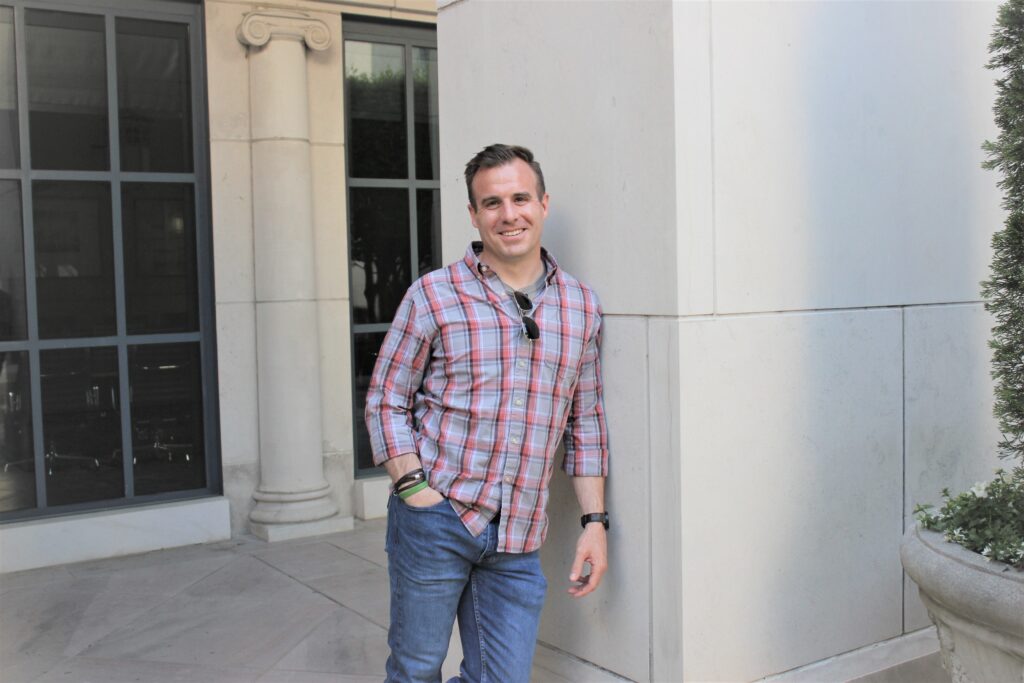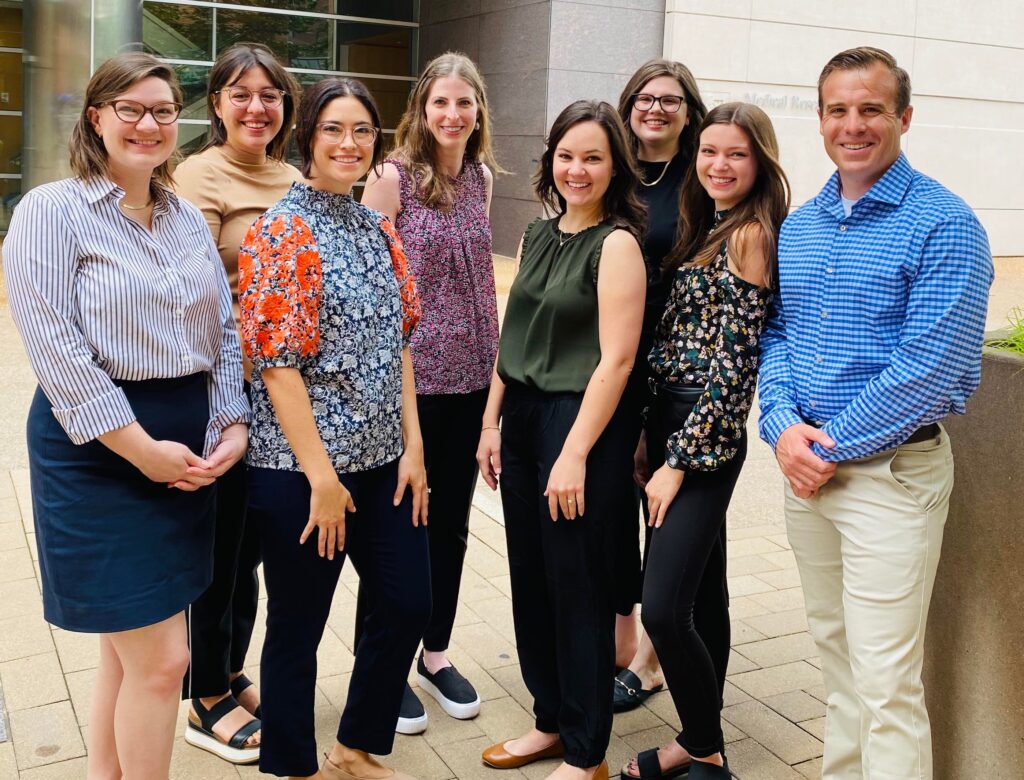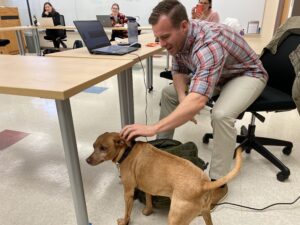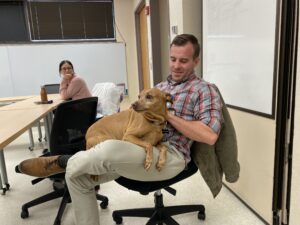MGC student Dave Baker counsels patients across the state
Genetic counseling student Dave Baker completed cancer genetics rotations in each of Tennessee’s Grand Divisions

By: Lexie Little
Dave Baker looked out at the road ahead. Nearly three hours of his five-hour drive between Kalispell and Bozeman, Montana, had passed since leaving the clinic where he shadowed genetic counselor Tiana Pallister. All the while, he thought about his own road ahead, not that paved with asphalt, but his future as a college student studying bioengineering after nine years of service in the United States Army.
The phone rang.
“Hi, Dave, it’s Dr. Anderson. I am happy to tell you that I nominated you for the university’s presidential emerging scholar award, and you’ve won. I hope this strikes you as good news. You’ll be working with me on a research project for the next year should you accept.”
Baker, then a sophomore, didn’t know what to say. The entire drive, he had thought about nothing but changing his major.
“Imagine me driving five hours back thinking, ‘Yep, I’m going to change my degree. I’m not going to do this bioengineering degree. I should just major in biological sciences,’” Baker said. “Well, I got a call on my way back from one of my professors saying that he had nominated me, and I’d been awarded the presidential emerging scholar award…It was a great honor, and I didn’t want to be that guy that says, ‘Oh, hey, things just changed for me. I’m going to change my degree.’”
The Kentucky native chose to study bioengineering with a minor in biomedical engineering based on a desire to help others. During his time in the military, he found reward in leading other soldiers, seeing them grow through adversity and overcome obstacles they encountered. He wanted to feel that same sense of purpose in his career after his discharge. Yet, after a year of working in a hospital lab space on projects to indirectly benefit patients, he realized he missed human-to-human interaction.
He accepted the opportunity to study as a presidential emerging scholar and moved forward with his studies, but he knew a turn in the road lay just ahead – one that would lead him more than 1,700 miles to Vanderbilt University School of Medicine.
Researching a path forward
During his days of research, Baker found genetic counseling through a simple Google search.
“I read about the field in the great state of Montana, where I was at the time, and there were only around five genetic counselors in the whole state. One of them agreed to let me shadow her – Tiana Pallister. I’ll never forget her. Once I was in there [after the five-hour drive], I got to watch her counsel a patient and, for example, give bad news to one sibling and good news to the other about a genetic condition. It was in that moment that I had that ‘ah-ha’ moment, hearing the way she spoke to these patients regardless of the news, both of them leaving the situation a little more confident and with more understanding of what was ahead of them. That impact that I saw was what I was looking for when I got out of the military. That’s when I decided to pursue genetic counseling nonstop.”
VUSM launched its Master of Genetic Counseling program in 2019, graduating its first cohort in 2021, the same year Baker applied and matched at Vanderbilt. Unlike some of his classmates, Baker entered his studies with a subspecialty in mind.
Genetic counselors typically specialize in one area of medical genetics, examining markers in prenatal care, cancer, cardiology, neurology, and other subspecialties. For Baker, cancer genetics proved the most interesting and accessible.
“Investigating cancer excites me, which I know may sound a little weird,” he said. “If you get down to it, cancer is essentially your cells turning on your body. It’s your own cells causing your sickness, and that is wild to me. We have so many mechanisms in our bodies to sustain you, but all of the sudden, it flips around, and now our cells are causing issues. Just that alone sparks my interest in cancer. Of course, I took specific cancer genetics courses in college, and my interest fed off from those and grew from there. I gained an appreciation for the illness to a point to where I’ve learned enough about it that I feel confident that I could be decent at breaking it down for a patient to where they could understand what is happening or what might happen.
“Across all subspecialties, we have to be able to take this high-level, complex information and translate it into a way that the patients can understand and then use themselves.”
MGC students begin clinical rotations in the spring of their first year of study, continuing through April of the following year to learn how to translate information across areas. Practicum work guides students through rotations in prenatal, general, cancer, specialty, and laboratory genetics.
Through MGC’s unique curriculum, Baker put his knowledge and practice to the test while serving patients in each of Tennessee’s Grand Divisions.

Hitting the road
After presenting on a constitutional mismatch repair deficiency syndrome (CMMRD) case, a rare disorder that increases cancer risk in pediatric patients, Baker walked out of the room somewhat stunned. CMMRD is more frequently seen and counseled at specialized centers.
“Baker, who did you tell that you were coming down here?” one of his colleagues said, jokingly.
CHI Memorial Hospital had seen an uptick in rare genetic cases since Baker’s arrival in Chattanooga for a three-week rotation. But nothing about his path to genetic counseling had been traditional, and he preferred working that way.
“[That rotation] was good for me in the sense that I got out of the world of academia and saw how counseling operates in more normal, daily hospital work environments,” he said. “In my opinion, I got to see more diverse patients and a lot more diversity of cases. That was one of the first places I counseled a patient on having two genetic markers instead of one, learning how to approach that situation. I got to see some very rare cases…. I got to work with two great genetic counselors and learn their styles and get a different idea of how workflow operates in a different setting. It was 2022 at the time, but they still used paper charting. Here at Vanderbilt, that’s not what we do. So, that was a different skill I had to learn. I loved being there for those three weeks.”
While Baker enjoyed working with adult populations, he sought to broaden his training by working with pediatric patients. Knowing he wanted to work in the cancer genetics space, he asked if he could complete his required elective rotation at St. Jude Children’s Research Hospital in Memphis, Tennessee.
Early on, he contacted MGC program leadership to see if the experience would be possible.
“The program was so great,” he said. “They took care of everything. They set up contracts. I was asking if there was anything I could do to help because I felt there was something I should be doing, but they took care of it. I just said, ‘Hey, I want to do this,’ and they said, ‘Done deal.’ I went [to West Tennessee and St. Jude], and it was such an awesome experience.”
He remembered walking in for the first time. Everywhere he looked, he saw children smiling as they played on the playground or interacted with health care workers. Each session, he gained an appreciation for the resiliency and positivity of his patients. They entered genetic counseling sessions jumping around, throwing balls, and playing despite a full-morning chemotherapy session.
Genetic counselors prepare to talk to patients under many different circumstances. Baker said one of the most important lessons he learned was that counselors can never truly anticipate how patients will take or interpret the information, needing to be mindful that practitioners do not always know what someone’s situation or outlook may be. In the case of his pediatric patients, he sat in awe of their positivity.
“When we hear child cancer, it doesn’t bring positive emotions,” he said. “But somehow, St. Jude has turned that place into one of the happiest places I’ve ever been in my life. Every day, it was such a privilege to work with those kids. They’re little rock stars. I can’t tell you how eye-opening it is to see the resilience children have. When you talk to adult patients who just had chemo, they’re generally wiped out and need time before holding a conversation. But sometimes, I would see these kids after a chemo session, and they still have the energy and spirit. It was like, ‘Holy cow, these kids are battling cancer, but they’re just living their lives, day-to-day.’ It gave me such an appreciation for the resilience they had, and I loved every second of talking to them.”
Looking back while looking ahead
Thanks to his experiences in the Master of Genetic Counseling program, Baker has already secured a position as a cancer genetic counselor at Baptist Health in Lexington, Kentucky. He credits both his instructors and his patients as teachers along the way, listening to each of them as he practiced in simulation sessions or encountered them on rotations.
“All of the instructors are great,” he said. “We are learning from some of the foremost genetic counseling leaders, and that speaks volumes to the level of knowledge they can pass on to us. We get a lot of experience in real-world scenarios based on their encounters. In our critiques and their recommendations for us, they’ll give us notes based on their experiences. It could be things we would never think of or read in a textbook or paper, but because it happened to them once, they were able to give us key advice for situations we might possibly encounter.
“I don’t think there’s ever been one session when they’ve said, ‘Yep, you did great. No critiques.’ They always try to find something you can improve on, even if it’s not, say, something that could have gone better. They might propose a similar or slightly different scenario and give you advice about what might work in that instance. They always try to find a way to help you improve.”
Baker said working with patients taught him even more ways to approach his work.
Entering sessions, he often let patients guide the conversation to learn what information would be most important to them.
“We should give them time to figure things out and explain things to us, and try to read how they internalize things,” he said. “That can really shape how you determine what is most important for that patient. A lot of times, and I’ve had patients vocalize this, they come to clinics and feel like they’re just getting talked to without anyone taking the time to make them feel like a priority or make them feel heard…In my practice, I kind of let them lead the conversation so I can learn what is most important to them and how I can tailor our session to them.
“There is important and prudent information each patient needs to know and understand. Equally important is navigating how to accomplish educating patients on these complex concepts in a manner that ensures they accept and understand how to apply the information towards their own personal health choices and goals. This ability to provide a holistic, tailored approach to patient education and psychosocial counseling is something I feel sets genetic counselors apart.”
As he prepares to graduate on May 12, Baker likewise reflects on the respect he felt during the MGC program. He noted that his instructors listen to students much like they listen to their patients, respecting them as individuals and future colleagues rather than trainees.
He knows the incoming MGC Class of 2025, welcomed officially through the genetic counseling match on April 19, will feel the same sense of support he discovered.
“The amount of support this program gives each and every student I would have never expected from any program in general,” he said. “You can tell that they care about us succeeding…If ever you voice a struggle area or something like that, you will not just have one person helping you; you will have a team of people helping you try to figure it out.
“The support that MGC here at Vanderbilt has provided to each student is unreal. I’ve been in positions without a lot of support, so what they offer is just mind-blowing. [Our instructors] wanted to know about us. It felt so personable. You can tell when you get here that they want to treat us like people and see us have success. They want to graduate genetic counselors who are the best in the field, and they will bend over backwards to get us there.”
Even if students take a long road to find success.

